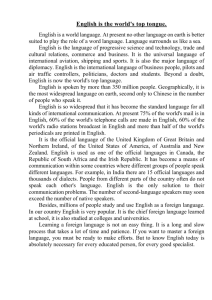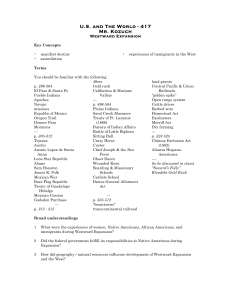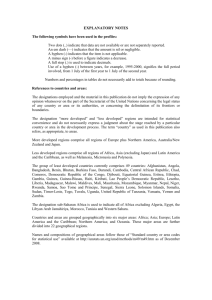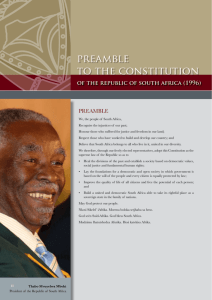Promoting Responsible International Investment in Agriculture Government of Japan
advertisement
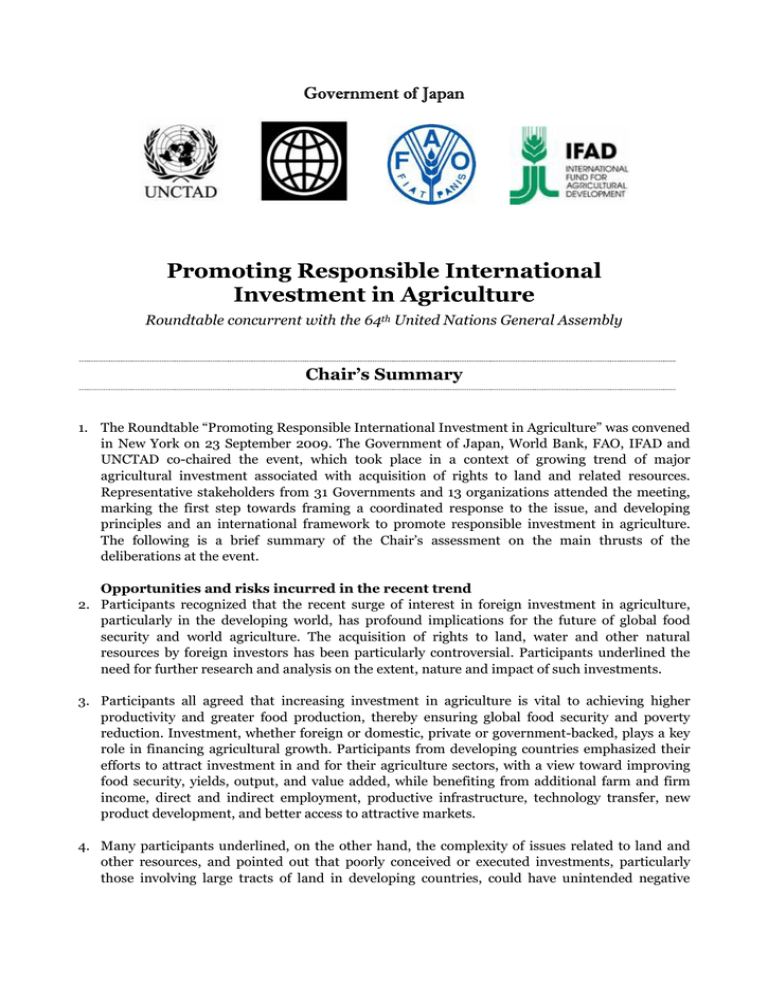
Government of Japan Promoting Responsible International Investment in Agriculture Roundtable concurrent with the 64th United Nations General Assembly Chair’s Summary 1. The Roundtable “Promoting Responsible International Investment in Agriculture” was convened in New York on 23 September 2009. The Government of Japan, World Bank, FAO, IFAD and UNCTAD co-chaired the event, which took place in a context of growing trend of major agricultural investment associated with acquisition of rights to land and related resources. Representative stakeholders from 31 Governments and 13 organizations attended the meeting, marking the first step towards framing a coordinated response to the issue, and developing principles and an international framework to promote responsible investment in agriculture. The following is a brief summary of the Chair’s assessment on the main thrusts of the deliberations at the event. Opportunities and risks incurred in the recent trend 2. Participants recognized that the recent surge of interest in foreign investment in agriculture, particularly in the developing world, has profound implications for the future of global food security and world agriculture. The acquisition of rights to land, water and other natural resources by foreign investors has been particularly controversial. Participants underlined the need for further research and analysis on the extent, nature and impact of such investments. 3. Participants all agreed that increasing investment in agriculture is vital to achieving higher productivity and greater food production, thereby ensuring global food security and poverty reduction. Investment, whether foreign or domestic, private or government-backed, plays a key role in financing agricultural growth. Participants from developing countries emphasized their efforts to attract investment in and for their agriculture sectors, with a view toward improving food security, yields, output, and value added, while benefiting from additional farm and firm income, direct and indirect employment, productive infrastructure, technology transfer, new product development, and better access to attractive markets. 4. Many participants underlined, on the other hand, the complexity of issues related to land and other resources, and pointed out that poorly conceived or executed investments, particularly those involving large tracts of land in developing countries, could have unintended negative Government of Japan impacts in terms of political stability, social cohesion, human security, sustainable food production, household food security or environmental protection for the receiving country. Local people could lose access to the resources on which they depend. There was a view expressed that measures to mitigate negative impacts associated with large-scale international investments in developing countries are urgently needed. 5. Participants were aware of calls by various stakeholders to develop principles, guidelines or codes of conduct to govern such investments. Some participants stressed the need for prompt actions, as a year has already passed since the phenomenon first gained attention, but progress remains limited. Consensus emerged after discussions that all the constituencies which the participants represent, i.e. governments, the private sector, civil society and international organizations, should work together to develop principles and an international framework which translates the principles into action. Developing consensus around principles and international framework 6. Participants discussed the following key tenets and reached a broad agreement that they could be a basis for the principles around which the international framework is designed. The overwhelming view was that the principles should be legally non-binding but have a flexible mechanism for monitoring, taking into account country-specific circumstances. Land and Resource Rights: Existing rights to land and natural resources are recognized and respected. Food Security: Investments do not jeopardize food security, but rather strengthen it. Transparency, Good Governance and Enabling Environment: Processes for accessing land and making associated investments are transparent, monitored, and ensure accountability. Consultation and Participation: Those materially affected are consulted and agreements from consultations are recorded and enforced. Economic viability and responsible agro-enterprise investing: Projects are viable economically, respect the rule of law, reflect industry best practice, and result in durable shared value. Social Sustainability: Investments generate desirable social and distributional impacts and do not increase vulnerability. Environmental Sustainability: Environmental impacts are quantified and measures taken to encourage sustainable resource use, while minimizing and mitigating them negative impact. 7. Participants emphasized that the process of agreeing on principles and developing international framework must be based on vigorous and evidence-based public debate and broad consultations, thereby providing voice to all stakeholders, then reconciling and supporting the interests of receiving countries, local communities, and investors. The overriding objective is to create a “win-win-win” situation and promote responsible investment in agriculture, which Government of Japan optimizes the impact of increased investment to maximize the benefits and to minimize the inherent risks for all involved, thereby achieving sustainable and inclusive agricultural development in receiving countries. 8. Participants recognized that the efforts in this regard should draw on the past good practices and experience gained and, where appropriate, content already developed by relevant guidelines, standard schemes or codes of conduct, whether public or private. Examples include the Equator Principles, the Extractive Industry Transparency Initiative (EITI), Santiago Principles, OECD Guidelines for Multinational Enterprises, and numerous commodity or theme specific schemes. The process of formulating the international framework should also be in line and compliment with other food security initiatives. 9. Participants also discussed the way to facilitate the formulation of more equitable investment contracts and selection of suitable business models including joint ventures, contract farming and outgrower schemes, as well as appropriate legislative and policy frameworks in receiving countries. 10. It was proposed that the international framework should also facilitate compilation and sharing of relevant data and information, lessons learned and good practices, creation of analytical and operational tools. In this regard, participants welcomed a joint proposal by a group of international organizations to create a knowledge platform and toolkit for addressing questions of international investment in development country agriculture. The way forward 11. Participants expressed general support to the joint efforts by the World Bank, FAO, IFAD and UNCTAD to contribute to a broader consultative process that will lead to agreement on the principles and framework. The consultative process will be initiated by these organizations with close coordination with key investing/ receiving countries, private sector, civil society and other international organizations. The process should be as inclusive as possible, and with a clear time frame. 12. Participants were determined to follow up the above discussions and bring forward the agenda, taking advantage of events such as the World Bank Annual Meeting in early October, European Development Days later in October, the FAO World Summit on Food Security in November, the OECD-UNCTAD Global Forum on International Investment in December, and beyond into 2010. Progress will be reviewed in the course of six months. Government of Japan The Roundtable was attended by over 70 people from 31 countries and 12 organizations. The participants included representatives from the Governments of Australia, Republic of Belarus, Federative Republic of Brazil, Republic of Bulgaria, Republic of Cameroon, Canada, Central African Republic, Union of Comoros, Kingdom of Denmark, Arab Republic of Egypt, French Republic, Federative Republic of Germany, Republic of Ghana, Holy See, India, Republic of Indonesia, Republic of Italy, Japan, Grand Duchy of Luxembourg, Republic of Moldova, Islamic Republic of Pakistan, Independent State of Papua New Guinea, Democratic Republic of Sao Tome and Principe, Kingdom of Saudi Arabia, Republic of South Africa, Republic of Korea, Kingdom of Sweden, Swiss Confederation, United Republic of Tanzania, United Kingdom of Great Britain and Northern Ireland, United States of America, European Union, Food and Agriculture Organization of the United Nations (FAO), International Fund for Agricultural Development (IFAD), International Food Policy Research Institute (IFPRI), Organisation for Economic Co-operation and Development (OECD), United Nations Conference on Trade and Development (UNCTAD), World Bank, United Nations World Food Programme (WFP), International Institute for Sustainable Development, International Land Coalition, Rabobank International and Yara International. Any inquiry about this Summary should be addressed to Shunichi Inoue (shunichi.inoue@mofa.go.jp/ +81 3 5501 8339), Deputy Director for Economic Security, Ministry of Foreign Affairs of Japan.


